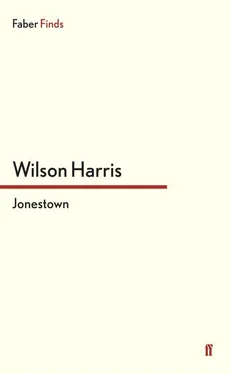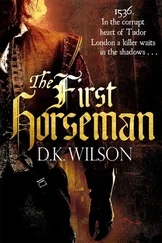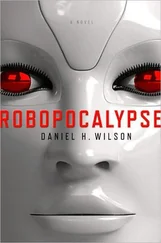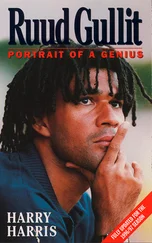Wilson Harris - Jonestown
Здесь есть возможность читать онлайн «Wilson Harris - Jonestown» весь текст электронной книги совершенно бесплатно (целиком полную версию без сокращений). В некоторых случаях можно слушать аудио, скачать через торрент в формате fb2 и присутствует краткое содержание. Год выпуска: 2011, Издательство: Faber & Faber, Жанр: Современная проза, на английском языке. Описание произведения, (предисловие) а так же отзывы посетителей доступны на портале библиотеки ЛибКат.
- Название:Jonestown
- Автор:
- Издательство:Faber & Faber
- Жанр:
- Год:2011
- ISBN:нет данных
- Рейтинг книги:5 / 5. Голосов: 1
-
Избранное:Добавить в избранное
- Отзывы:
-
Ваша оценка:
- 100
- 1
- 2
- 3
- 4
- 5
Jonestown: краткое содержание, описание и аннотация
Предлагаем к чтению аннотацию, описание, краткое содержание или предисловие (зависит от того, что написал сам автор книги «Jonestown»). Если вы не нашли необходимую информацию о книге — напишите в комментариях, мы постараемся отыскать её.
Jonestown — читать онлайн бесплатно полную книгу (весь текст) целиком
Ниже представлен текст книги, разбитый по страницам. Система сохранения места последней прочитанной страницы, позволяет с удобством читать онлайн бесплатно книгу «Jonestown», без необходимости каждый раз заново искать на чём Вы остановились. Поставьте закладку, и сможете в любой момент перейти на страницу, на которой закончили чтение.
Интервал:
Закладка:
I was incredibly grateful to Mr Mageye, for his kind word, his encouragement. But I felt sad all the same. I sensed he was preparing me for his departure from the Dream-book of which he had been an architect as much as I was, indeed more so than I …
‘Are you sure, Mr Mageye,’ I asked with a kind of lameness in my voice, ‘that Kali — in this banqueting hall — is a Wheel-Computer? I have not seen such mechanics of Spirit before.’
‘I am,’ said Mr Mageye with a gleam in his eye that sprang from the depths of his hidden laughter.
The children — some wore greybearded masks — and the beggars were somersaulting and leaping in imitation of the Kali Wheel. Others hopped on sticks like Legba. Others shaped themselves into agile Anansi legs. Still others created a broken brow or cavern — streaked with the straw of dolls’ blood — through which they leapt.
‘These children live in Dream-computers, Francisco,’ said Mr Mageye as he turned his Sphinx-like brow upon me. The ghost-children achieved such leaps at times that it was as if he occupied a foothold or a handhold at the very base of the Wheel where nothing moved.
‘Yes,’ he said, ‘they live in computers as the twentieth century draws to a close. Their soul occupies computer games. They mimic wars in heaven and on earth in computers. They climb spiders’ web, they visit dragons. They fondle serpents. They are cycled and recycled in computers. They are children of the Wheel who die to themselves upon Venus and Mars and in the Milky Way. In an age when it is said that the ghost has fled the machine they are the returning ghost, the thieves and the beggars and the clowns who now inhabit the spirit of the game in the machine.’
‘What do they see from the Moon?’ I asked.
‘They see a black-out wilderness Sky above the Moon. They see the universal unconscious or the collective unconscious (as some Jungian bodies would put it).’
‘It’s alive, that unconscious,’ I said and felt like a Fool.
‘It’s alive,’ the Sphinx that resided under the Wheel confessed. ‘Yes, it’s alive for it is possessed of the rhythm of the spheres, or the music of the spheres, black-out music or song — if you like — in the rhythms of an apparently unconscious universe. We hang, don’t we, upon every flare for a signal of life from a far distant light-year planet.’ The Sphinx was jesting, it seemed, to imply bridges of space across vast distances between light-year suns, light-year planets, and planet Earth with its star or sun. ‘We hang, don’t we, upon orchestrations of death and life. For who knows whether light comes from extinct stars whose death or resurrection we are still to prove. The music of the spheres — as the ancients used to put it — is now black-out song upon the lips of living ghosts which blend concretion and apparition …’
I was stunned as if I myself were unconscious yet inhabited in the great Dark of myself by singing ghosts as the voices of the children woke me and brought me back to life in the wheeling games that they created.
I saw their black-out lips in the blistered shoes that they wore at the door of my mother’s Albuoystown shop. Their flesh crept through those holes, through their patched garments, as they stood on the Moon and sang with a hidden choir in the crumbling Grave of space.
‘They are children of a lame humanity in the computer of the Moon,’ said Mr Mageye, ‘on the Wheel of time.’
‘Do they seek a new Church,’ I asked, ‘a new Rome?’
‘They are possessed of a virus of Spirit ,’ said Mr Mageye. ‘Make no mistake about this. They are involuntary explorers of numbers in every machine, joy-riding machines and fast computers, involuntary mathematicians of Chaos, lottery populations on the Wheel. Who is to live, who is to die, upon an overcrowded planet?’
‘Virus of Spirit?’ I demanded. ‘Virus is poison. ’
‘Ah, Francisco,’ said the Sphinx Mr Mageye, ‘you startle me out of my wits.’ The children were bouncing upon him now as if he were Atlas with the Moon on his back. It was all he could do to recover his breath and speak.
‘Love is an ailment,’ said Mr Mageye at last. ‘We all know that, do we not? Love is ill. Love has become a kind of infection of the nerves, a disorder. We make love. What does it mean to make love? The nerves of lust become active. Love your enemies is the supreme commandment that breaks all other commandments in that one exposes oneself to be bombed, or blasted, or ridiculed, or loathed, or labelled a vile hypocrite. To love one’s enemies tends to signify that one desires their wives or husbands, that one is plotting to steal their possessions, their ass, their horse, their sacred property. To love one’s religion is to blow oneself up in a car in order to kill as many on the road as possible. To love one’s faith is to crusade that one’s faith is the only true faith and all other faiths misguided. To love one’s friends is a pretty hazardous business at times. Caesar loved Brutus. Brutus loved the people. He was a patriot. Love then is tainted by treachery and patriotism. When I speak of the virus of Spirit, Francisco — let me make this clear — I am implying a capacity in Spirit to endure torment in the name of Love, a Love that unravels tainted systems to orchestrate the illnesses that plague humanity into a numinous dispersal of fanatical absolutes.’
He paused and I dreamt that I could perceive a curious fraying within the garment that he wore, as if threads had been loosened in his tussle with the children who still swarmed upon him, or clung to him, when they were not upon or in the Kali Wheel.
‘Deacon alas,’ said Mr Mageye — as he plucked a thread from within his garment — ‘equated the virus of Spirit with inoculation with the venom of the Scorpion Constellation when he fell into the folkloric Imagination of the people. He saw such inoculation as a shield against the bite of pain, he saw it as the shield of power. Whereas the virus of Spirit is a measure of access to the profoundest unravelling of the charisma of power, access to acute and innermost tormenting self-knowledge …
‘I prefer to die now, Francisco, than to become a vegetable institution on the sick-bed of the humanities …’
‘You are no vegetable institution, Mr Mageye,’ I cried. ‘How in God’s name could you say this? Stay with me.’
‘Perhaps not,’ said Mr Mageye, ‘but the Sphinx in the desert of the Imagination that we tend to witness on every hand is becoming a Vegetable, and if one could begin to unravel that supreme Vegetable, to pass sentence of death upon oneself in Play or Dream-book, then, who knows, we might salvage a future from the ruins of the past. It is a worthwhile sacrifice, is it not Francisco?’
The banqueting hall was now veiled in the mystery of past futures, future pasts, open to originality.
Jonah Jones was now crossing the hall from the seat that he occupied under the Constellation of the Spider Whale and Anansi Tiger. Or so it seemed in the darkened hall. Constellations rise and fall and change their shape in black-out orchestras and music and song.
‘Jonah,’ I cried. ‘What has happened to you — I scarcely know you now — in the Grave of space? I knew who you were over there. You were large as a Titan. Now — as you cross the floor — you have shrunk. You’re a dwarf. You are — it’s difficult to describe it — a bubble which a child blows from bone or flute on the Moon into space. There’s a precipice in space that is black, but when it sings one dreams of universal repentance. Do dwarfs repent more easily than Titans? If so you are truly welcome, Jonah, to join the band of mischievous children that you see around you.’
Читать дальшеИнтервал:
Закладка:
Похожие книги на «Jonestown»
Представляем Вашему вниманию похожие книги на «Jonestown» списком для выбора. Мы отобрали схожую по названию и смыслу литературу в надежде предоставить читателям больше вариантов отыскать новые, интересные, ещё непрочитанные произведения.
Обсуждение, отзывы о книге «Jonestown» и просто собственные мнения читателей. Оставьте ваши комментарии, напишите, что Вы думаете о произведении, его смысле или главных героях. Укажите что конкретно понравилось, а что нет, и почему Вы так считаете.












